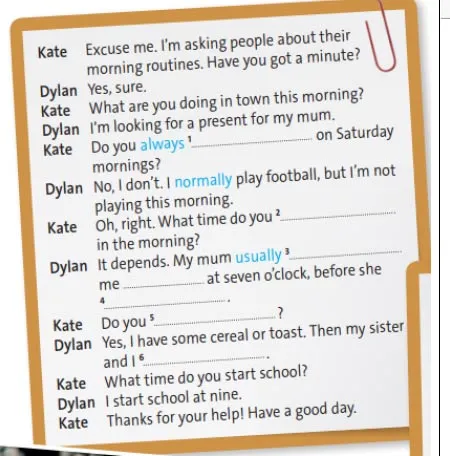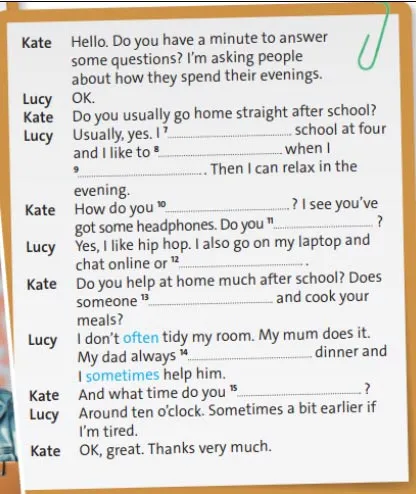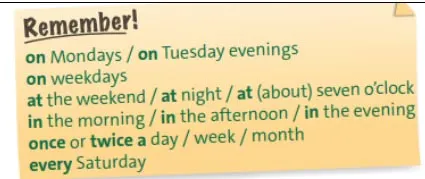Giáo án Tiếng Anh 8 Friends Plus được biên soạn rất cẩn thận, trình bày khoa học các bài học Starter Unit, Unit 1, Unit 2, Unit 3 theo chương trình sách giáo khoa. Giáo án Anh 8 Friends Plus giúp thầy cô tham khảo để soạn giáo án dạy môn tiếng Anh lớp 8 năm 2023 – 2024 cho học sinh của mình.
Bạn đang đọc: Giáo án Tiếng Anh 8 sách Chân trời sáng tạo (Học kì 1)
Kế hoạch bài dạy Tiếng Anh 8 Friends Plus giúp học sinh tiếp thu kiến thức tốt nhất. Đồng thời giúp giáo viên có một cách dạy mạch lạc, rõ ràng, dễ hiểu khiến các bạn tiếp thu kiến thức tốt nhất, việc nhớ kiến thức bằng sự vận dụng trong bài giảng là cần thiết.
Giáo án Tiếng Anh 8 Friends Plus
Week :……………
Period:…………………..
STARTER UNIT
Lesson 1: Vocabulary: Routines
I can talk about routines and say when I do things.
I./. OBJECTIVES
1. Knowledge: By the end of the lesson, students will be able to:
– understand how to describe their daily routines.
– use adverbs of frequency to describe their daily routines.
– understand how to use adverbs of frequency in a sentence.
– know how to ask their friends about their daily routines.
2. Skills: Speaking, listening, reading, writing.
3. Attitude: Students know how to learn English correctly.
4. Competence: Writing, self-learning capability, creative capacity, ability to use language……
II./. PREPARATION:
1. Teacher: book, planning, TV
2. Students: books, notebooks
III./. TEACHING METHODS
Communicative approach, group Ss and T’s activities, play as a character, teaching methods with games, teaching methods by visual, teaching methods by practicing, discussion group, technical present….
IV./.PROCEDURE
1. Check–up: during the lesson
2. New lesson:
|
Teacher’s and Students’ activities |
Contents |
|
ACTIVITY 1: KNOWLEDGE FORMATION ❖ Aims: Help students pay attention to the content, and understand new vocabularies ❖ Products: Students’ answers ❖ Organization: Exercise 1: – Teacher explains the meaning of new words and gives some examples. – Teacher gives students time to think of answers. – Teacher invites students to answer questions in front of the class.
ACTIVITY 2: PRACTICE ❖ Aims: Help students understand how to use new words in exercise 1 to complete the dialogue and understand the meaning of dialogue ❖ Contents: Students work in particular ❖ Products: Students’ answer ❖ Organization Exercise 2: – Teacher gives students time to read the dialogue and complete answers – Teacher checks answers and invites students to answer questions in front of class Exercise 3: – Teacher gives students time to do the exercises. – Teacher invites some students to answer the exercise. – Teacher checks answers with the class. – Teacher gives students some new adverbs of frequency and explains the meaning. Exercise 4: – Teacher gives students time to work in pairs – Teacher suggests students some topics and questions. – Monitor while students are working and give general feedback at the end. – Teacher invites some students to speak in front of the class. Exercise 5 – Teacher gives students time to write a paragraph about their partner’s daily routine. – Teacher invites some students to speak their paragraphs and give feedback.
ACTIVITY 3. HOMEWORK – Learn by heart all the structures and new words. – Do exercises (in workbook). – Prepare new lesson. |
1. Study the words in the box. Which of these things do you do every day?
(Students’ own answers.) New words: – cook: nấu ăn – do my homework: làm bài tập về nhà – finish: kết thúc – get home: về nhà – get up: thức dậy – go shopping: đi mua sắm – go to bed: đi ngủ – go to school: đến trường – go to work: đi làm – have breakfast: đi ăn sáng – listen to music: nghe nhạc – relax: thư giãn – tidy my room: dọn phòng – wake up: tỉnh giấc – watch videos: xem video Suggested answers: – do my homework – get home – get up – listen to music – go to bed – go to school
2. Complete the interviews using the correct form of the verbs in exercise 1. Then listen and check.
Suggested answers 1. go shopping 2. get up 3. wakes me up 4. goes to work 5. have breakfast 6. go to school 7. finish 8. do my homework 9. get home 10. relax 11. listen to music 12. watch videos 13. tidy your room 14. cooks 15. go to bed
3. Look at the words in blue in the dialogues in exercise 2. Where do adverbs of frequency go in a sentence? Think of more adverbs
(Students’ own answers.) New words: – always: luôn luôn – normally: thường thường – usually: thường thường – often: thường xuyên – sometimes: thỉnh thoảng
Suggested answers: – If a sentence has only one verb, place the adverb of frequency in the middle of the sentence. For example: Tom never flies. He always takes the bus. – When a sentence contains more than one verb, place the adverb of frequency before the main verb. For example: They have often visited Europe. – The adverb of frequency is placed after TO BE verb. For example: She is always happy, – The adverb of frequency is placed before a verb. For example: She always does her homework in the evening. – Other adverbs of frequency: + never: không bao giờ + seldom: hiếm khi + frequently: thường xuyên + occasionally: thỉnh thoảng + daily: hằng ngày Example: 1. We take a vacation at least once annually.. 2. We seldom see John. 3. My dentist told me I should floss twice daily.
4. USE IT! Work in pairs. Ask and answer questions to compare your daily routines. Use time expressions, adverbs of frequency and the words and phrases in exercises 1 and 2. Are your routines similar?
(Students’ own answers.) Suggested answers: – Suggested topics: + After-school Activities + Weekend Activities + Before bed-time Activities + Everyday Favorites Activities – Suggested questions: + What time do you get home from school? + What time do you go to bed? + Do you go to the gym after school? + Do you watch television at night + What type of drink do you have every day? + How many times a day do you brush your teeth? 5. USE IT! Use the information about your partner in exercise 4 to write a paragraph about their daily routine Suggested answer: My friend’s name is Minh. She often gets up at 6 AM. Then, she brushes her teeth and has breakfast with her family. After that, she goes to school. She finishes school at 5 PM and gets home. In the evening, she does her homework. Then, she relaxes by listening to music and playing games. Finally, she goes to bed at 9 PM. |
|
|
*Feedback:…………………………………………………………………………………………………………….
……………………………………………………………………………………………………………………………..
……………………………………………………………………………………………………………………………..
……………………………………………………………………………………………………………………………..
Week :…… Date of preparing:………….
Period:/…….. Date of teaching:……………
STARTER UNIT
Lesson 2: LANGUAGE FOCUS: Present simple and present continuous
I can talk about repeated and scheduled actions and things happening now.
I./. OBJECTIVES
1. Knowledge: By the end of the lesson, students will be able to:
– understand how to use present simple and present continuous
– use present simple and present continuous to answer questions
2. Skills: Speaking, listening, reading, writing.
3. Attitude: Students know how to learn English correctly.
4. Competence: Writing, self-learning capability, creative capacity, ability to use language……
II./. PREPARATION:
1. Teacher: book, planning, TV
2. Students: books, notebooks
III./. TEACHING METHODS
Communicative approach, group Ss and T’s activities, play as a character, teaching methods with games, teaching methods by visual, teaching methods by practicing, discussion group, technical present….
IV./.PROCEDURE
1. Check–up: during the lesson
2. New lesson:
………….
Tải file tài liệu để xem thêm giáo án Tiếng Anh 8 Friends Plus






